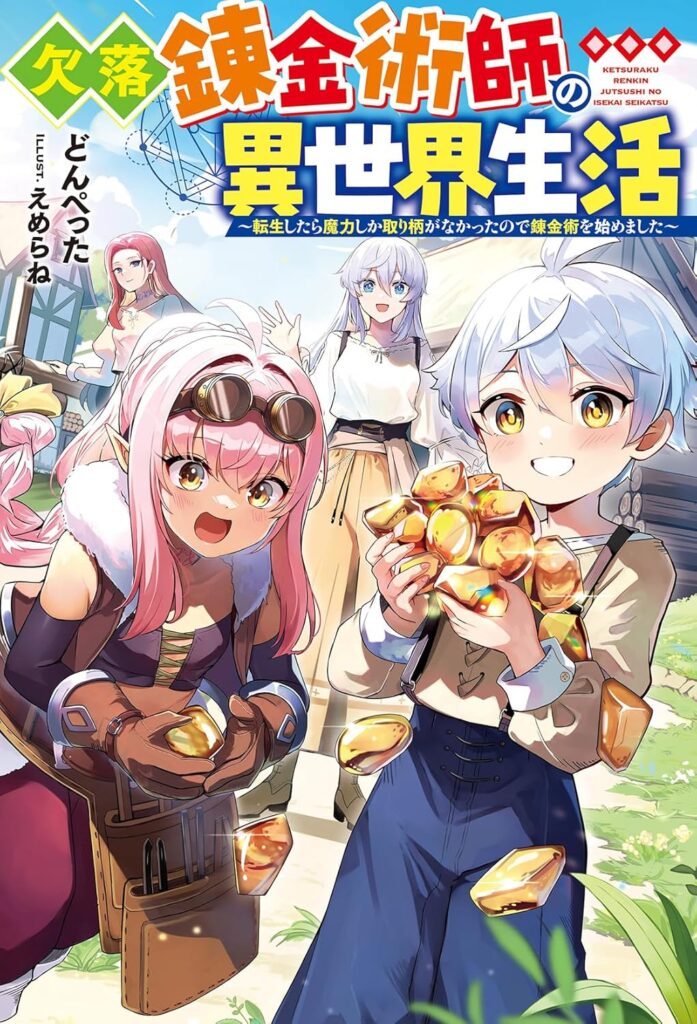
Kays Translations
Just another Isekai Lover~
Chapter 4: You’re Supposed to Greet People with a Smile, Aren’t You?
Three days after we finished hanging the wheat to dry, word came from the village chief as well—his fields had also been harvested. With that, it was finally time to begin the long-delayed discussion.
The meeting would be held in the assembly hall that stood right beside the chief’s home. The place served a double purpose, for in times of disaster it functioned as a refuge for the villagers. Its thick, double-layered outer walls kept voices from carrying beyond the chamber. Not that this particular meeting required absolute secrecy, but neither was it something to be broadcast publicly. In that sense, the hall was perfectly suited: a place where words could remain contained within stone.
Those present were few but significant. It was to be the three of us, joined by the village chief himself and his son, Autihel. In addition, at my mother’s request, Keties—the elder whom the village respected as a neutral arbiter—was asked to sit in as a witness.
The chief and Autihel entered with cheerful faces, seemingly oblivious to the gravity of what was to come. They smiled pleasantly, as though this were to be a simple matter, perhaps even a celebratory occasion.
“To think Lord Keties would honor us with his presence! Nothing could make me happier,”
the chief said, his eyes creasing in genuine delight as he bowed slightly to our witness.
Of course, their cheer came from a misunderstanding. When the invitation had been delivered, it had been phrased only as “a discussion regarding Mother’s marriage.” I had suspected the chief might not believe us even if we stated directly that no marriage was intended. Better, then, to withhold the full truth until all parties were gathered.
“I am here only as a witness,”
Keties replied evenly.
“I have no intention of interfering.”
“A witness for the discussion? Not… not for the wedding itself?”
The chief’s brows furrowed in confusion.
Among commoners in this world, marriage was a simple matter. Once a man and woman had both reached adulthood at eighteen, all that was required was for them to declare, “We are wed.” If a church stood in the village, the declaration was made there. If not, the village chief acted as the witness. There were no written records, no ceremonies with vows or rings—nothing of the sort.
Nobles, however, were another matter. For them, every change in the family—marriage, divorce, birth, death—had to be reported to the Office of Heraldry, which kept precise genealogies for the sake of inheritance. And noble weddings were almost always grand spectacles, uniting families before the eyes of the realm.
But none of that was relevant here. Today’s talk was not of union—it was, rather, of refusal. The central question was: why did Autihel believe he had proposed marriage and received consent from Mother in the first place? We had to uncover the root of that misunderstanding.
“For this matter, allow me to lead the proceedings,”
Stefana spoke calmly, her tone leaving little room for argument.
The chief’s face darkened.
“You? A slave? This is not your place to speak!”
In this village, the chief was the highest authority. To have a slave step forward to direct a meeting—it was unthinkable, a breach of order. His narrowed eyes carried a sharp warning: Do not overstep.
But Stefana did not falter.
“Yes, I am a slave. Yet my master is none other than Baron Tounis Merlot. By his direct command, I am tasked with addressing any matter that concerns Lady Martine.”
The revelation struck the chief like a blow. He lurched to his feet, eyes wide.
“What?! You belong to the Baron himself?!”
Keties raised a brow, faintly surprised.
“Oh? You truly did not know?”
Of course the misunderstanding was natural—Stefana had never declared her master openly. To most, it seemed obvious she was Mother’s slave. Though, come to think of it, Mother had never once said that was the case.
Mother, calm as ever, folded her hands on the table and explained:
“We deliberately keep this matter unspoken. If it were widely known that I am on good terms with the Baron, opportunists might approach in search of advantage. I would ask you all, please, to keep this knowledge strictly confidential.”
Keties nodded slowly.
“Indeed. Though I assumed the chief at least had been informed.”
That assumption, however, was precisely the problem. If there were anyone in this village most likely to exploit such knowledge, it would be the chief himself.
Stefana then inclined her head.
“Let us begin the discussion. Lady Martine, if you would.”
“Yes. Thank you.”
Mother straightened, her gaze steady. Her voice carried clearly through the hall.
“First, allow me to state this plainly. I will never marry Autihel.”
Her words fell like a stone in still water. No hesitation, no equivocation—simply a declaration.
Autihel frowned, tilting his head as though she were merely being timid.
“Martine, I understand your unease. If you wish to postpone the wedding, I can wait until next year. But in time you must decide. After all, heirs must be born, and sooner is better.”
The chief chimed in with a sagely nod.
“Indeed. This child of yours cannot inherit. The sooner you provide us with a true successor, the better.”
I clenched my teeth. They weren’t listening at all. Mother’s words of refusal had washed over them like rain on stone. Worse, they had already taken it upon themselves to discuss children and succession, as though the marriage were a settled fact.
Mother repeated, sharper this time:
“I will say it again: I will never marry Autihel. He has never proposed to me, and I have never given my consent.”
Her words, so direct, finally struck the men like a slap. Both Autihel and his father slammed their palms on the table, rising with anger.
“Martine! What nonsense is this?!”
“You mean to say you’ve deceived us all along?!”
The room shook with their fury.
But Keties’s voice cut through like thunder.
“Sit down. Compose yourselves at once!”
The authority in his tone brought both men back to themselves. Shaken, they exchanged a glance, then lowered themselves slowly back into their seats.
Mother’s voice was steady as she pressed her point.
“If I am accused of promises I never made—‘a proposal,’ ‘consent’—when I know nothing of them, what am I to call it but falsehood? A baseless charge?”
Autihel burst out again, his voice rising.
“That’s absurd! I did propose, and you accepted!”
So in his mind, it was true. And therein lay the danger. If his claim were accepted as fact, the consequences could be dire: Mother might be forced into marriage, or at the very least compelled to pay compensation.
“Then forgive me, Autihel, but would you kindly explain? When exactly did you propose, and how? I have no memory—no knowledge whatsoever—of such an event.”
Her deliberate emphasis—each word carefully measured—made his face pale. He stared at her as though she had struck him.
For a fleeting moment, even Mother seemed shaken. Had there truly been such a moment she had forgotten? Her hand trembled slightly on the table. Quietly, I reached over and took it, squeezing firmly, giving her a smile. You’re not wrong, Mother. I believe in you.
She steadied herself with a breath.
“Now then… will you tell me the details?”
Autihel shifted uncomfortably, then finally spoke.
“It was the day after we finished repairing the defenses. When I reported my success, Father told me it was time I married and produced an heir. So I proposed to you then, Martine—since you had always shown me affection.”
Mother blinked. The chief had told her the same thing—that his son was under pressure to wed. But affection? Never once had she given Autihel cause to believe such a thing.
Her voice carried a quiet, incredulous weight.
“You speak of affection. But why would you believe that I… harbored such feelings?”
Autihel looked at her as though the answer were obvious.
“What else could it mean? You visited me often. You came because you love me!”
Mother shook her head.
“I have never once gone out of my way to visit you, Autihel.”
“What? Don’t lie! Only last week, you came to see me yourself!”
Mother frowned slightly, searching her memory.
“Last week? Ah… I did visit the chief to ask about the timing of the wheat harvest. But I did not come for you.”
“That was only a pretext!”
“On that day, you happened to be present as well. We exchanged a brief greeting, nothing more.”
Autihel’s voice rose, indignant.
“You smiled at me! Do you deny it?”
I nearly groaned aloud. Of course she had smiled—smiles were the natural courtesy when greeting someone. Who frowns in greeting? Yet somehow, in Autihel’s mind, that single fleeting smile had become a declaration of love.
